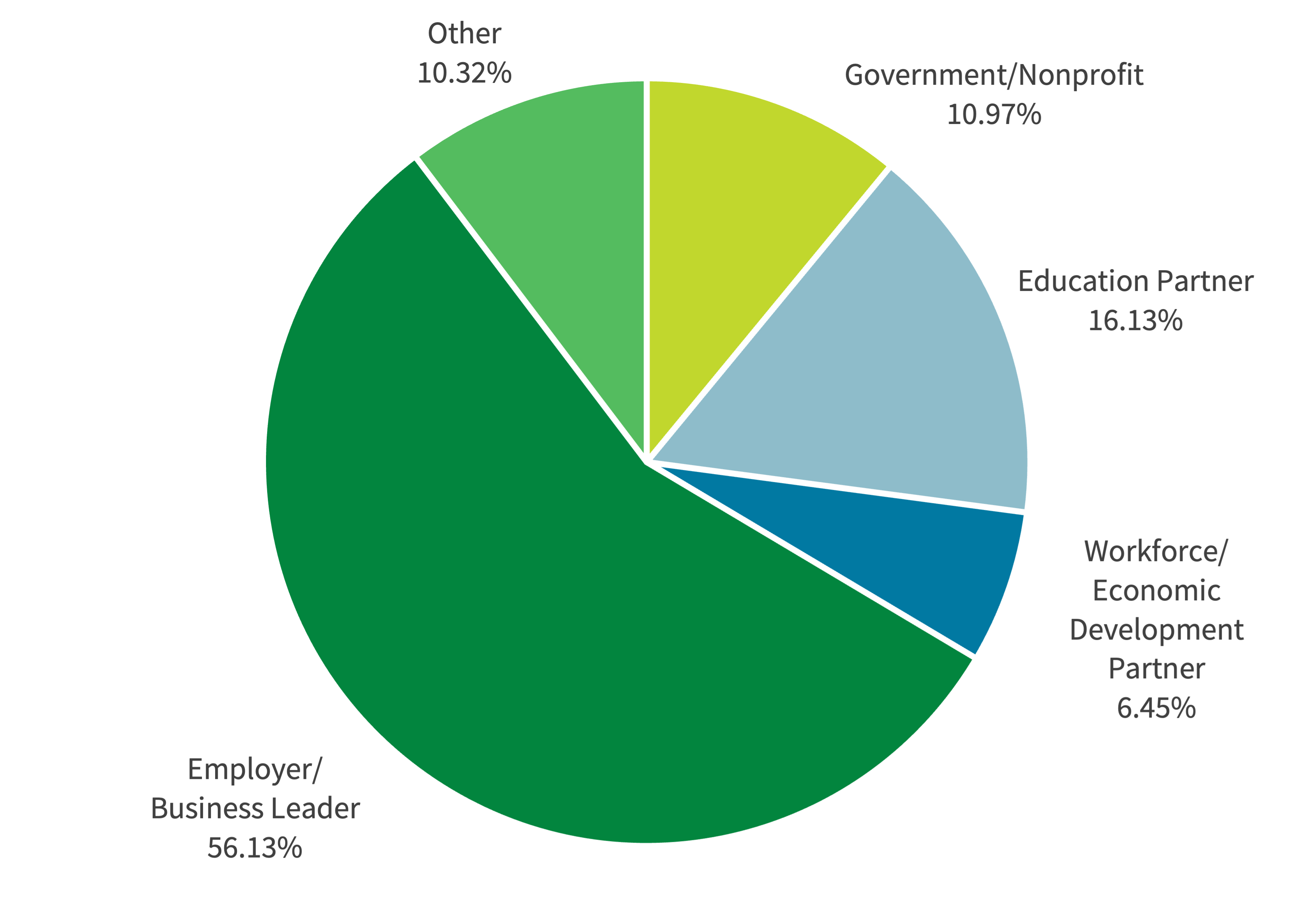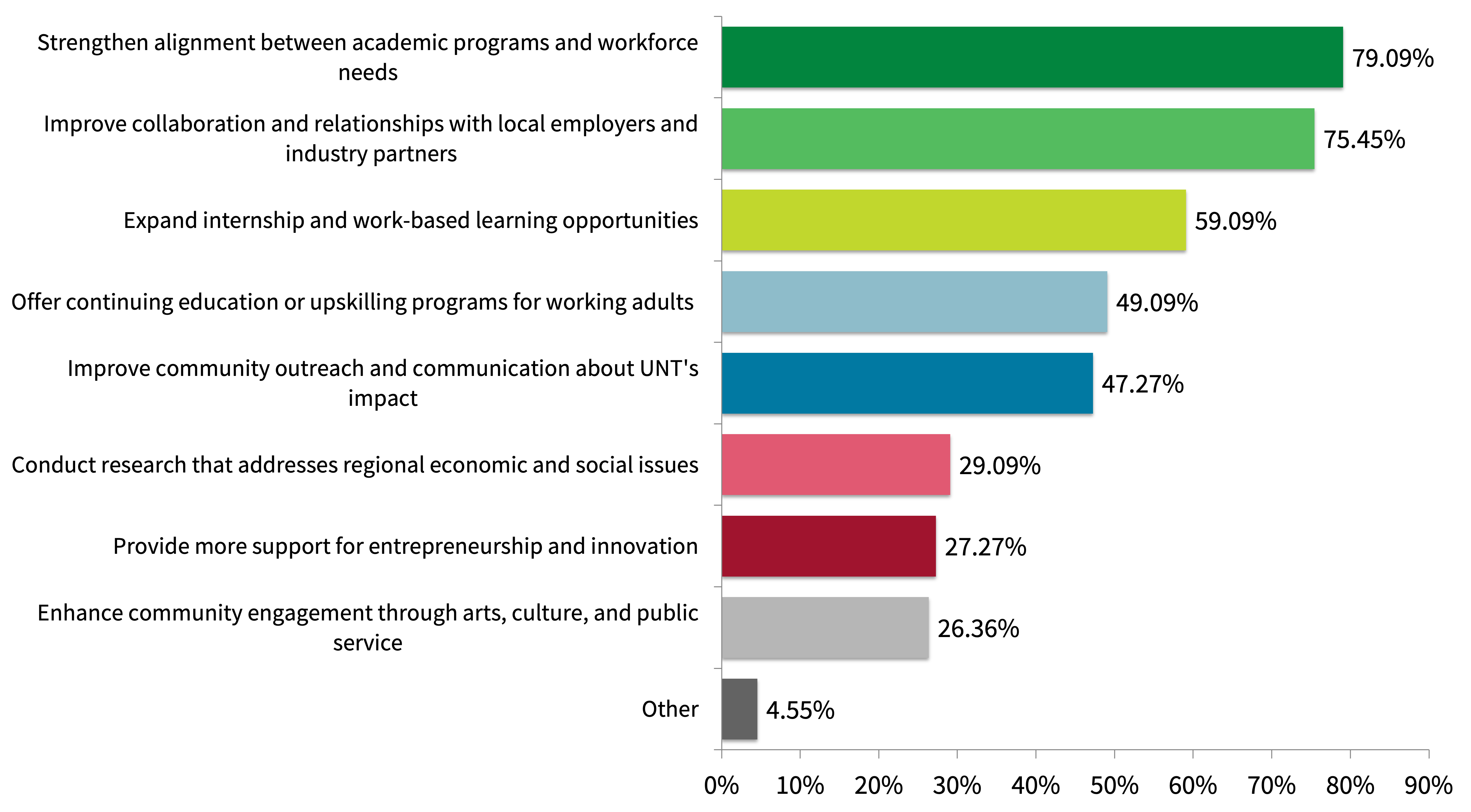- AcademicsDegree TypeLocations
- Admissions
- Tuition & Aid
- Student Life
- About UNT
- Research
- Athletics
- Giving
External Stakeholder Survey Summary
External stakeholders reflect on UNT’s impact, opportunities for partnership and innovation
This spring, UNT engaged a broad range of employers, workforce partners, education collaborators, government agencies, and nonprofit organizations in a survey to help inform the development of UNT’s five-year strategic plan. UNT President Harrison Keller, Ph.D., intends to launch the new plan at his November 5 State of the University address.
The survey was designed to gather feedback about UNT’s role in the North Texas region, its strengths and areas for improvement, and opportunities to enhance UNT’s impact through partnerships and innovation. Stakeholders were also asked to identify the most-desired skills for new hires and interns, high-demand job roles they struggle to fill, and what they perceive to be the region’s top challenges in the next five years.
Survey results echoed themes identified in recent Campus Conversations and advisory group meetings as both challenges and opportunities for UNT — themes directly connected to the vision outlined by President Keller in his 2025 Statement of Intent, as well as other themes with potential for broad impact.
Additional feedback was gathered from external stakeholders through focus groups, interviews, listening sessions, campus tours, and employer site visits this spring.
Stakeholder Snapshot: About the Survey Respondents
The survey was distributed to a number of UNT partners, posted on the UNT strategic plan website, and shared by other university partners such as the Denton Economic Development Partnership. Among the survey’s respondents, there was strong representation by logistics and supply chain-related sectors, notable participation from health care and education stakeholders, and other industries that reflect UNT’s impact and relevance across a wide range of sectors.
Top sectors included:
- Transportation, logistics, and supply chain
- Health care and medical
- Retail and wholesale
- Marketing, advertising, and public relations
- Finance, insurance, and accounting
- Education (K-12 and higher education)
- Consulting and professional services
- Technology and software development
- Construction and real estate
- Hospitality and food services
Select the one that best describes you

"Other" includes: Retired individuals, community investors, other professionals (e.g., physicians, attorneys), alumni, current and former staff and students.
Nearly 41% of respondents identified as alums or former UNT students, 55% had hired UNT graduates, 43% hosted UNT student interns, and 22% currently or previously served on advisory boards or committees. More than 73% had attended UNT-hosted, and 15% had partnered with UNT on research or innovation.
Regardless of how they had connected with the university, respondents showed an overwhelming interest in expanding their engagement with UNT:
- 62% showed interest in participating in networking events and hiring UNT graduates
- 54% want to host interns or co-op students
- 49% are interested in serving on an advisory board
- 48% offered to lead guest lectures or mentor students
- 28% indicated an interest in developing customized training or upskilling for employees
- More than 23% would collaborate on grants or funded initiatives
- 10% shared custom responses ranging from scholarship support and campus development to student and community support
Addressing the Region’s Top Challenges
More than 43% of respondents ranked talent development and workforce readiness (e.g., graduate preparedness and aligning academic programs with in-demand careers) as the greatest challenge for the North Texas region in the next five years. This echoes one of the focus areas in UNT’s new teaching and learning ecosystem, which is a university-wide initiative announced at the May 15 UNT Student Portraits Data Symposium.
Other challenges included economic growth and job creation, technological innovation and disruption — particularly AI and automation — and more.
Top suggestions for addressing these challenges included:
- Strengthening alignment between academic programs and workforce needs (79%)
- Improving collaboration and relationships with local employers and industry partners (75%)
- Expanding internship and work-based learning opportunities (59%)
- Offering continuing education or upskilling programs for working adults (49%)
How can UNT improve its efforts to address all the above challenges?

Top Jobs: High Demand, Highly Skilled
When asked about high-demand positions they struggle to find qualified talent, survey respondents identified health care roles — especially nurses — which aligns with national and regional trends.
Service and hospitality roles continue to face hiring challenges at frontline and supervisory levels, and even on-campus support roles are difficult to fill, signaling a tight labor market for part-time, student-facing positions. In marketing and communications, employers indicated a need for interns and entry-level employees with strong critical thinking skills and creativity but expressed concerns about over-reliance on AI and underdeveloped problem-solving skills.
When asked about the most needed skills for job candidates in their organization or industry, employers emphasized a need for candidates who can balance technical knowledge with strong people skills. Advanced technical competencies — especially in IT, cybersecurity, and data systems — are a top priority across sectors, but soft skills and interpersonal abilities remain foundational, with multiple respondents highlighting communication, professionalism, and customer orientation.
Perceptions of UNT: Strengths and Opportunities
When asked to share their overall perceptions of UNT, survey respondents ranked the institution highest for its affordability and academic reputation. UNT earned 3 out of 4 stars for its ability to produce qualified job candidates, with one respondent noting, “The [UNT] graduates I have hired are well-rounded and hard-working.”
Respondents rated UNT’s engagement with business and industry 2.8 out of 4 stars, indicating a generally favorable view with room for improvement. Suggestions to help UNT stand out and expand its connections in the region included:
- Telling more success stories about UNT alumni and the industries hiring UNT graduates
- Creating more experiential learning opportunities in all colleges
- Sharing the real-world impact of the wide range of federal, state, and industry projects and partnerships underway at UNT
- Strengthening UNT’s collaboration and communication with the local community
Supporting entrepreneurs and start-ups in the region earned the lowest rating at 2.5 out of 4 stars but was identified as “a true opportunity for the university overall.”
Strong partnerships across the North Texas region and beyond are critical to UNT’s commitment to seamlessly integrate access, innovation, and excellence to provide transformative value for students and advance the public good.
This survey is one of many ways the university is engaging external stakeholders to leverage UNT’s unique strengths, location, and talented community to address the educational and workforce needs of the region, state, and nation.